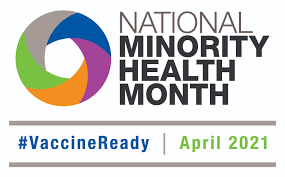With April’s designation as Minority Health Month, the focus on COVID-19’s impact on minority communities and possible solutions to mitigate that impact are at the forefront of many healthcare organizations and workers. The past year has seen communities devastated by COVID-19, and minority communities have been hardest hit.
The U.S. Department of Health and Human Services Office of Minority Health (OMH) is focusing on vaccination as a path to help protect people in racial and ethnic minority and American Indian and Alaska Native communities. With a #VaccineReady theme, the organization highlights the need for these vulnerable communities to have access to getting the vaccines, information to trust the vaccine process, and the resources to help people keep their full schedule of vaccine doses.
According to OMH, the focus on the Minority Health Month includes helping minority communities
- get the facts about COVID-19 vaccines,
- share accurate vaccine information,
- participate in clinical trials,
- get vaccinated when the time comes, and
- practice COVID-19 safety measures.
According to the COVID Racial Data Tracker, deaths from COVID-19 are proportionately higher in communities that have higher rates of Black or African American, American Indian or Alaska Native, Hispanic or Latino, or Native Hawaiian or other Pacific Islander residents. The Centers for Disease Control and Prevention (CDC) offers several variables that result in these higher disparities including social determinants including wealth and income, health and healthcare, neighborhood and physical environment, occupation and job conditions, and education that impact minority health.
All of these variables impact residents in different ways but lead to a similar outcome that places minority communities at a higher risk of COVID infection and disease transmission. If residents in these communities have lower access to proper healthcare, a higher proportion of conditions that predispose them to severe disease risk, job conditions that leave less options for dedensified space or risk reduction in altered job duties, and close living conditions, then the urgency of getting people vaccinated quickly is high priority.
As vaccines become more widely available, access to appointments—whether it’s from setting up the appointment, getting to the appointment, or having time off from work—when they can get a shot (or two) remains problematic for many people. Local, state, and federal approaches to getting vaccines to enough people to have herd immunity will need to address and allay some of the deep-seated issues of mistrust around the medical establishment.
Organizations like the OMH and many municipalities are taking steps to begin addressing minority health issues and to encourage people to keep themselves and their communities as healthy as possible by getting vaccinated and urging others to do the same. Nurses can watch any of the videos produced by the American Nurses Association around reducing the racial disparities of the pandemic. The videos offer a wealth of education for nurses to learn about these disparities and learn how to effectively address them with patients and the larger community.
- Is the FNP Program Right for You? - April 24, 2024
- WOC Nurses Week Highlights Specialty - April 16, 2024
- Honoring Radiology Nurses Day on April 12 - April 12, 2024



